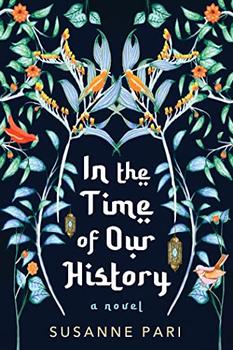Summary | Excerpt | Reading Guide | Reviews | Beyond the Book | Readalikes | Genres & Themes | Author Bio

Despite the traffic, Mitra arrived at the turnoff for Devon in an hour. The vehicle seemed to know its way: past the golf course at the country club where her father used to play tennis (trees hinting at the gold and red of autumn), through the condominium development that had caused such a ruckus when her father's company built it ten years before, over the plank bridge (now reinforced with steel), past the grammar school where Bobbie Dowd had thrown a rock at her forehead from the top of the jungle gym and Nancy Goldberg had lost a chunk of her red hair in Mitra's fist, and then into the town of Devon, named for the dairy cows, lowing ghosts now.
Three days short of a year ago, Nezam had driven Mitra here from the airport. Her brain had registered nothing of her surroundings; she'd felt numb since the phone call came that her sister was in serious condition from a car accident. Anahita and the children were already dead, of course, but this was the Jahani family way. News of death was not imparted over the phone, in a letter, or even in person, until it was absolutely necessary, like on your way to the morgue. To take this tack was thought of as being sensitive, being careful not to shock the person, but that night when Nezam turned the car, not into the hospital's parking lot but the mortuary's, Mitra grabbed the collar of his jacket, yanked and shook, and screamed Coward! over and over. Poor guy, he was as devastated as she. No. He was better off; everyone was. Only Mitra knew the accident might have been prevented. Worse, that she might have caused it. She and a man she'd never met.
There were no empty spaces in front of the Starbucks, which had obliterated the Dairy Queen two years before. The main drag of downtown Devon still boasted a kosher deli and Kleinfeld's Fine Jewelry, but where the Woolworth's used to be was a market that advertised fresh eel and Korean videos—a testament to the influx of Asian immigrants. There was a different nail salon every two or three stores, each offering mani-pedis at bargain prices. In every one, Mitra saw the ghost of her sister, hands and feet stretched out for painting.
She parked in one of the diagonal spaces next to the train tracks. Even when she was a child, no trains came through here; the tracks had been left intact to lend a certain small-town quaintness to Devon. The old stone station was now Café Buon
Gusto! Like so many suburban cafés, it was a restaurant, not a place where you could drop in for coffee, a pastry, and the newspaper.
Mitra crossed the street, reminding herself with pleasure that jaywalking was generally ignored on the East Coast, and headed toward what used to be the corner candy store, where her father had forbidden them to go because only bad American children hang out there. Inside, it had been close and hot all year-round, the floor-to-ceiling shelves packed with useless but gotta-have items that suburban children spent their allowances on: baseball cards, glitter, fake mustaches, comic books, spinning tops, Mouseketeer hats, warm Pepsi in a glass bottle. Mitra had never liked candy, but that hadn't prevented her from stealing a great many jawbreakers from the grizzled owner and his dwarfish wife, standing guard behind a peeling Formica counter no bigger than a foot square.
As Mitra went into the store now, two crimson-lipped matrons stepped around her, accents Jersey-nasal, a plethora of tinny t's and yawning i's. The store had a bright and roomy 7-Eleven look, with a smiling Bengali clerk behind the counter ("Register has no more than $30 cash"). Mitra averted her eyes from the shelves of primary-color candy and snacks (Skittles! Nina squealed in her ear) and from a small toy section where she'd once bought Nikku a balsa airplane. She walked swiftly to the tall counter and asked for a pack of American Spirit Blues, forked over the bills, and was glad to find herself back on Main Street.
Excerpted from In the Time of Our History by Susanne Pari. Copyright © 2023 by Susanne Pari. Excerpted by permission of Kensington Publishing. All rights reserved. No part of this excerpt may be reproduced or reprinted without permission in writing from the publisher.
Your guide toexceptional books
BookBrowse seeks out and recommends the best in contemporary fiction and nonfiction—books that not only engage and entertain but also deepen our understanding of ourselves and the world around us.